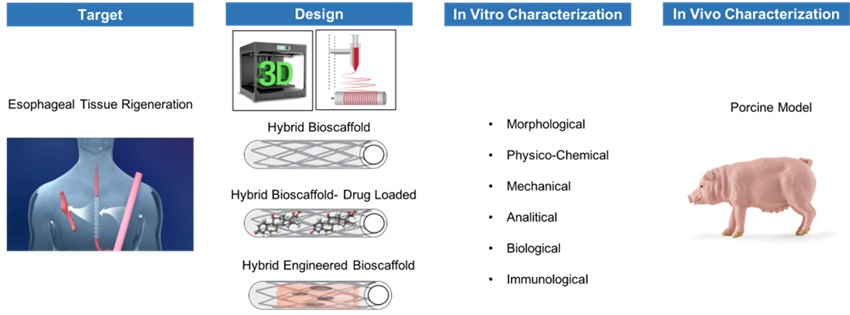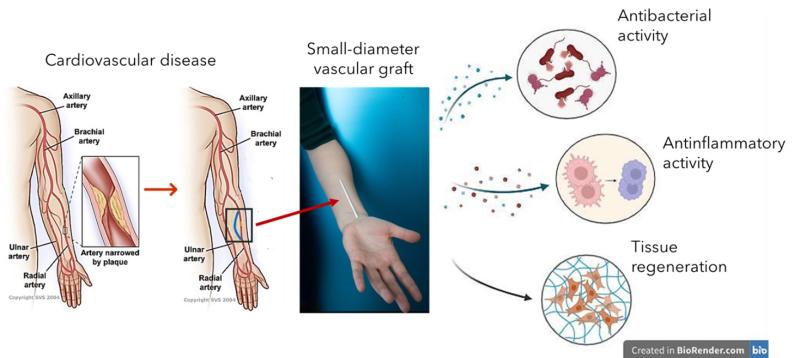Università degli Studi di Pavia - unipv.it
TUBULAR SCAFFOLDS FOR TISSUE REGENERATION

PROJECT — 3D-Hybrid Engineered Tubular Bioscaffold for Esophageal Tissue Regeneration: from in vitro to in vivo validation
Ministry of Health, RC-2021-n.986-rcr2021i-24
Research Unit contact person: Prof. Bice Conti, Dr. Silvia Pisani
Project contact person: Prof. Marco Benazzo
Email – bice.conti@unipv.it; silvia.pisani@unipv.it
Abstract
Congenital and acquired esophageal malformations and especially malignant esophageal cancer, require esophagectomy and endoscopic mucosal resection. The resected tract must be replaced with autologous conduit but this procedure is associated with significant morbidity, rupture of suture or stenosis and a mortality rate of about 4%. To satisfy this unmet medical need, we propose to explore new combinations of tubular biodegradable biocompatible scaffolds obtained combining 3D printing and Electrospinning techniques, and to test them in vivo in an animal model. The scaffolds will be seeded with autologous Bone Marrow-MSCs to assess their function in regenerating a larger portion of esophagus and to study cell behavior and growth factor secretion during the process, with the ultimate purpose of accelerating, improving and optimizing the procedures for surgical replacement. Moreover, in order to reduce postoperative inflammation and avoid infections, we will investigate loading of Anti-inflammatory and Antibiotic drugs in the polymeric scaffolds that will be used in this contest either as cell supports and local drug delivery systems.
Keywords – tissue engineering; polymer scaffold; electrospinning; animal model; MSCs
PROJECT — Small-diameter vascular grafts: a platform towards local and targeted delivery in tissue engineering
Project contact person: Prof. Bice Conti, Dr. Mariella Rosalia
Email – bice.conti@unipv.it; mariella.rosalia01@universitadipavia.it
Abstract
Vascular grafts (VGs) are biological of artificial conduits used as replacements for damaged blood vessels the in the treatment of several vascular diseases. Due to the growing prevalence of cardiovascular conditions particular interest towards the development of synthetic VGs has increased. Currently, commercially available synthetic VGs are predominantly made of non-degradable materials like polyethyleneterephthalate or expanded polytetrafluoroethylene, which are suitable materials for large vessels substitution, but not for replacing of small-caliber vessels with a diameter smaller than 6 mm. In fact, the production of small-diameter vascular grafts is particularly challenging, because of the higher incidence of thrombosis, intima hyperplasia and reduce patency. Moreover, synthetic VGs are susceptible to bacterial infection. Even though vascular graft infections are relatively rare (1-6% incidence), they are severe and life threatening complications, challenging to diagnose and treat, often involving polymicrobial infections and biofilm formation. To address these challenges, we propose the use of nanotechnology for the manufacture of tissue-engineering small-diameter vascular grafts, with antimicrobial properties. This project aims to develop biodegradable tubular scaffolds using polyesters such as polylactic-co-glycolic acid and photocurable polyglycerol sebacate, embedding antimicrobial and immunomodulator drugs to prevent infection and promote the grafts’ integration into the host tissue.
Keywords small-diameter vascular grafts; tissue engineering; biopolymers; antibiotics; inflammatory drugs.

